- Home
- Isaac Hooke
Planet Killer (A Captain's Crucible Book 4)
Planet Killer (A Captain's Crucible Book 4) Read online
BOOKS BY ISAAC HOOKE
Military Science Fiction
A Captain's Crucible Series
Flagship
Test of Mettle
Cradle of War
Planet Killer
Book 5 (Jan 2017)
Alien War Trilogy
Hoplite
Zeus
Titan
ATLAS Trilogy (published by 47North)
ATLAS
ATLAS 2
ATLAS 3
Science Fiction
The Forever Gate Series
The Dream
A Second Chance
The Mirror Breaks
They Have Wakened Death
I Have Seen Forever
Rebirth
Walls of Steel
The Pendulum Swings
The Last Stand
Thrillers
The Ethan Galaal Series
Clandestine
A Cold Day In Mosul
Terminal Phase
Visit IsaacHooke.com for more information.
PLANET KILLER
A CAPTAIN'S CRUCIBLE
BOOK FOUR
Isaac Hooke
This is a work of fiction. All characters, names, organizations, places, events and incidents are the product of the author's imagination or used fictitiously.
Text copyright © Isaac Hooke 2016
All rights reserved.
No part of this publication may be copied, reproduced in any format, by any means, electronic or otherwise, without prior consent from the copyright owner and publisher of this book.
www.IsaacHooke.com
Cover design by Isaac Hooke
Cover image by Shookooboo
Special thanks to the following Beta Readers who helped out with Planet Killer:
Nicole P.
Lisa A. G.
Gregg C.
Jeff K.
Mark C.
Jeremy G.
Doug B.
Jenny O.
Lezza M.
Gene A.
Larry J.
Allen M.
Gary F.
Robine
Eric
table of contents
one
two
three
four
five
six
seven
eight
nine
ten
eleven
twelve
thirteen
fourteen
fifteen
sixteen
seventeen
eighteen
nineteen
twenty
twenty-one
twenty-two
twenty-three
twenty-four
twenty-five
twenty-six
twenty-seven
twenty-eight
postscript
about the author
acknowledgments
one
Jonathan focused on the steel bulwark he had built with his mind. He imagined soldiers and combat robots armed with laser rifles and plasma blasters, roaming to and fro along the upper walkways of that bulwark. He envisioned autonomous pulse cannon emplacements, ready to track and fire upon anything that moved in the darkness beyond.
Movement drew his gaze to the murk, where swirling shapes had begun to form in the blackness. The captains and crews who had served underneath him and died in combat. Their bodies were stacked one atop the other, forming a vast pile that easily equaled the height of the bulwark. Admiral Hartford Knox resided at the top, pointing down at him accusingly.
Jonathan lost his concentration and the bulwark crumbled.
“Failed,” a disembodied voice informed him. “Unconducive brain wave pattern. Open your eyes.”
He did so, and found himself once more seated cross-legged amid the individual stalks of a wheat field. A red pyramid, blue sphere, and green box slowly hovered at eye level about a meter in front of him, each the size of a fist and slowly revolving around its Y axis. The wheat field stretched before him all the way to the horizon, where snow-capped mountains nestled in the distance. The sun peered down from a nearly clear blue sky. Around him, the wheat swayed to and fro, as if affected by a gentle breeze. He did not feel that breeze, or the sun, on his skin.
“Concentrate on the three-dimensional objects,” the voice said again.
Jonathan tried, but his gaze drifted to the wheat. Growing amid the stalks was a flower gone to seed, its globular head covered in downy tufts. One of the tufts loosened and drifted away on the gentle wind. Beside it, from another stalk, baby spiders launched into the air, dispersing on threads of silk.
Soon Jonathan would be free like that, too. Free of all burdens.
“Concentrate on the three-dimensional objects,” the voice repeated.
Jonathan sighed, and then shut down the virtual environment of the psi training app. The peaceful field winked out, replaced by the steel-walled holding cell of the brig, where he was seated cross-legged on the bare deck beside his bunk. He resided aboard Etalon Station, in orbit above the third planet of Beta Ursae Majoris.
“You don’t want to develop your psi defenses?” the voice said. It belonged to the local AI of the aReal glasses he wore. The glasses were connected to the cloud computing resources of the station, so that essentially he conversed with the station’s AI core.
He glanced longingly at the empty bunk above his own, wishing he had a human cellmate. The AI would have to do.
“I didn’t expect it to be so hard,” Jonathan said.
“Nothing is ever easy,” the AI replied. “Not for humans.”
“I suppose not,” Jonathan said. He stared at the steel bulkheads around him. “Did you know, my crew developed psi shielding?”
“I was not aware,” the AI said.
“Yes. It will take some time, of course, before shielding protocols percolate throughout the fleet. But once they do, no one will need psi defenses.”
“That will prove beneficial,” the AI said. “Considering that only those with the inborn ability can develop them in the first place.”
“Too bad my inborn ability is so weak,” Jonathan replied.
“You would have never become captain if you were any stronger,” the AI intoned.
“True enough.” He reached under his aReal glasses and rubbed his eyes. If he had been stronger, they would have drafted him straightaway into the psi corps.
“Do you wish to run the training app again?” the AI asked.
Jonathan shook his head. “What does it matter? I’m not going to be in the navy for much longer, anyway.”
“You don’t know that the trial will find you guilty,” the AI said.
“And I don’t know I’ll be acquitted, either,” Jonathan said.
“Another program then, perhaps?” the AI asked.
Jonathan considered. Access to an aReal was a prisoner’s legal right. However, the station authority restricted those programs he could execute, limiting his VR sessions to the nonviolent type. Not that he was in the mood for the violence at the moment. “Yes. Bring up Galactic Explorer.”
In seconds he was soaring through the vast gulf of deep space, his disembodied form hurtling past colorful nebulae, strange planets and flaring stars. He sighed contentedly.
Oh, to be out there again for real.
As he passed through a particularly beautiful star system, he found himself musing upon the nature of reality. Photons, the gauge boson or force carrier for electromagnetism, were emitted when an electron or other atomic particle transitioned to a lower energy level. Emitted was perhaps the wrong word, beca
use those photons merely represented a bundle of properties that always existed, casting a shadow known as matter in the three dimensions of this universe.
After a state transition, these bundles of properties that had become photons were represented as electromagnetic waves in our three-dimensional universe, where they traveled until absorbed by another electron or atomic particle, transitioning said particle to a higher energy level, and returning the bundle of properties to its shadow state. This transition could be used to harness cellular energy, as in the case of photosynthesis, the basis for all life on Earth. Photons created in the core of a star could take up to a million years to transition to the corona, due to constant collisions, absorption and reemission.
Repulsive forces existed in the bundles of properties that represented all matter. Nothing ever really touched. There were no actual solids in the world. The only thing that prevented Jonathan from passing through the vast empty spaces between the molecules of the deck and those of his body were those repulsive forces. This reality, this falsehood the mind created, interpreting those spaces as solids solely because of the resolution limits of the human eye and the tactile sense of human touch, gave substance to a substanceless world and created the falsehood of reality. Beams of lights, photons, were absorbed by the retinal molecule—C20H28O—in the photoreceptors of the eyes, provoking an isomerization that was translated into nerve impulses, creating the illusion of vision in that grand computer program called reality, as executed by the human brain.
We think we’re real. But we’re not.
None of what he saw was real, not entirely. Things like virtual reality only further simulated a simulated world. Neither were real, not virtual reality, nor actual reality. At least not from the point of view of the universe. From the false constraints of the human mind, maybe, but to the universe, no.
That was why it really didn’t matter what the outcome of his trial was. Not in the least.
If I were to die now, all of this would wink out instantly, replaced by nothingness.
He remembered asking one of his AI tutors, when he was but a young boy of five: “What is death?”
The AI played a video feed on his aReal, consuming his vision with a scene of a mountain lake. Birds chirped nearby. An alphorn echoed from the mountains. The sunlight reflected from the rippling water. The scent of evergreens and freshly turned soil wafted to his nostrils via the olfactory extensions of the aReal he had at the time.
“Do you see the mountain?” the AI asked. “The lake?”
“Yes,” Jonathan said.
The screen went black. All sounds vanished. All scents.
“That is death,” the AI said.
Jonathan sighed. Virtual reality always made him question his existence, and his place in the overall scheme of things. Especially when he ran apps like Galactic Explorer.
He resolved to clear his mind and to concentrate on the experience. For the past minute, though his eyes were open, he hadn’t really seen a thing. He focused on the swirling colors of the accretion disk surrounding the black hole he was passing, and the distortions its gravitational lens caused to the Large Magellanic Cloud behind it.
In the upper right of his vision, text abruptly flashed.
Incoming call.
He didn’t recognize the caller, but he shut down the VR experience with a sigh and connected in “holographic display” mode.
A man appeared in the center of the cell, in the spot where Jonathan performed his morning pushups. He was seated in a holographic chair.
“Captain Dallas,” the man said.
“That’s me,” Jonathan replied. “Though I’m not captain of anything but a steel cell at the moment.”
“My name is Lieutenant Francis McAvoy,” the man replied three seconds later. “I’m uploading my complete background information to your aReal now.”
A message box popped up on Jonathan’s aReal, asking him to approve the information transfer request. Jonathan’s gaze lingered on the virtual box, but then he glanced at the man without accepting.
Sensing Jonathan’s reluctance, McAvoy said: “I’ve been appointed to represent you against the charge of ‘conduct to the prejudice of good order and discipline,’ as set out in General Article 134 of the Manual for Courts-Martial.”
Ah. Jonathan’s legal counsel.
He accepted the data packet and glanced over the lieutenant’s background contained therein.
A naval aviator, McAvoy was previously an attorney in civilian life. He had been temporarily pulled from duty aboard the USS Martin to offer free counsel to Jonathan. It wasn’t clear whether McAvoy remained aboard said vessel, which was apparently operating in the vicinity, though the three second lag between his responses hinted at that.
“I’m not charged with attempted mutiny?” Jonathan asked.
“No,” McAvoy said a moment later. “A charge of ‘making a mutiny’ would be harder for the prosecution to prove.”
“How so?”
“A mutiny involves a violent change of command or refusal to obey orders with no basis in navy protocol or regulation. According to the data I have reviewed so far, you believed you were invoking Article 1088 of the United Systems Navy Regulations when you attempted the vote of no confidence against Admiral Hartford Knox. There was no violence involved, and the aforementioned article gave you the basis for your attempt. A charge of mutiny, going by the definition of Article 94 of the Manual for Courts-Martial, would not stick. But the conduct charge, well, it’s a catch-all provided for complicated offenses that don’t fall under any other articles. And the prosecutor obviously believes it has a prima facie case, or we wouldn’t be here.”
“I see,” Jonathan said. I’ll never escape Hartford’s ghost.
McAvoy frowned. “Were the charges against you not read in the presence of a commanding officer and neutral third officer before your confinement?”
“I suppose they were,” Jonathan said. “I’m not too big on pretrial confinement. More than seventy-two hours have passed. I was hoping to have free reign of the station by now.”
“The judge advocate deemed you a flight risk.” The judge advocate was the legal counsel for the prosecution.
“The judge advocate?” Jonathan said. “But he doesn’t have the legal authority to confine me.”
“It, not he,” McAvoy said. “Lieutenant Commander Lanvar is an Artificial. And it convinced the president of the court that you were a flight risk.”
Jonathan shook his head. “A flight risk. I don’t even have the codes to the station shuttles. Or any of the airlocks. How can I be a flight risk?”
McAvoy shrugged. “The decision was made.”
Jonathan sat back. “Tell me something. Can I win?”
McAvoy folded his hands. “Straight up? I don’t know. I haven’t been able to review the full extent of the case—I’m locked out of all the classified information that’s involved. And it won’t be released to me until you accept my counsel. I should probably warn you, Admiral Knox was well-liked, and the president of the court just so happened to be a good friend of his.”
“Great,” Jonathan said.
“So. Do you accept my services?” When Jonathan didn’t answer immediately, the lieutenant added: “You may request AI counsel instead, or of course retain a private attorney to represent you in conjunction with myself. Someone outside the chain of command who can potentially devote more time to your case. At your own expense, of course.”
Jonathan waved a dismissive hand. “I accept your services. And I won’t be hiring a civilian attorney.”
The lieutenant nodded three seconds later. “Good.” His eyes momentarily defocused as he checked something on his aReal. “I see you waived your right to a pretrial investigation.”
“That’s correct,” Jonathan replied.
“May I ask why?”
“I want to get this over with as quickly as possible,” Jonathan said.
“I see,” McAvoy said.
“What
do you need from me?” Jonathan asked.
“At the moment?” McAvoy said. “Nothing. I simply wished to introduce myself. I’ll have to review the classified logs that are now available to me. Most of it seems to be from the AI core of the Callaway. You personally backed up this data?”
“Yes,” Jonathan said. “On the holographic drives I brought with me.”
“I trust the data has not been tampered with in any way?”
Jonathan pressed his lips together. He didn’t like the man’s accusatory tone. “If the data was tampered with, the checksums wouldn’t add up.”
“I suppose so,” McAvoy replied. “But as your legal counsel, it is my duty to ask. By the way, the judge advocate plans to call the two captains who returned with you to the stand: Captains Rail and Rodriguez. Should I be concerned about either of their testimonies?”
Jonathan frowned. “I don’t think Rail will have good things to say about me.”
“Can she present any damning evidence?”
“None that won’t already be present within the AI core,” Jonathan said. “But the truth is, she doesn’t like me very much. I’ve got a judge who hates me, a witness who loathes me, and an AI prosecutor that believes I’m a flight risk. Things are looking up.”
“I will be in touch with any questions, Captain Dallas. Thank you.” McAvoy tapped out.
Jonathan stared at the empty cell before him. I’m going to lose.
Via his aReal, he pulled up Article 1088 of the United Systems Navy Regulations. Titled “Relief of a Commanding Officer by a Subordinate,” it explained the conditions by which a subordinate could relieve his or her CO.
It is conceivable that most unusual and extraordinary circumstances may arise in which the relief from duty of a commanding officer by a subordinate becomes necessary, either by placing the commanding officer under arrest or on the sick list, or in the case of a commanding officer resident aboard a separate vessel, by invoking a vote of no confidence as per Provision 194...

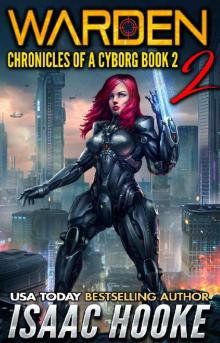 Warden 2
Warden 2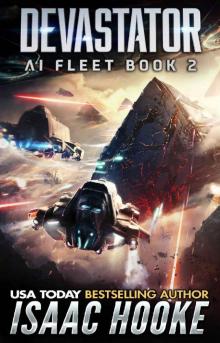 Devastator
Devastator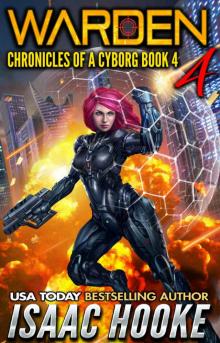 Warden 4
Warden 4 Emperor
Emperor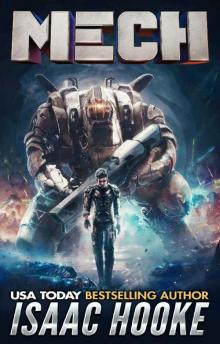 Mech
Mech Conqueror
Conqueror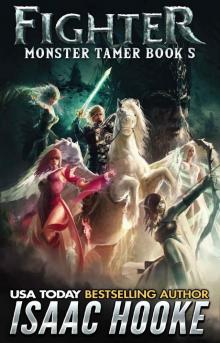 Fighter
Fighter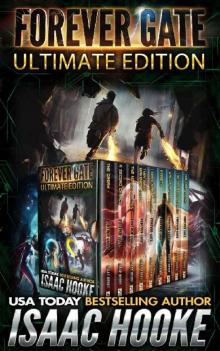 The Forever Gate Ultimate Edition
The Forever Gate Ultimate Edition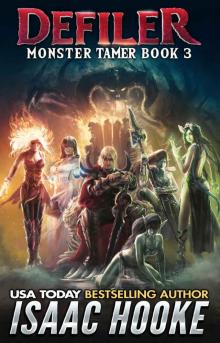 Defiler
Defiler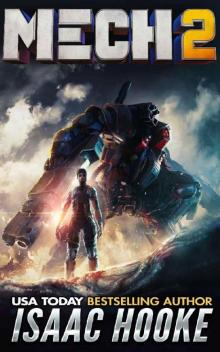 Mech 2
Mech 2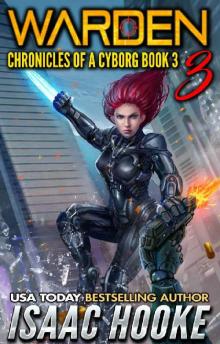 Warden 3
Warden 3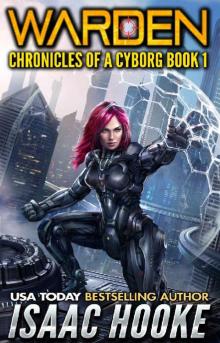 Warden 1
Warden 1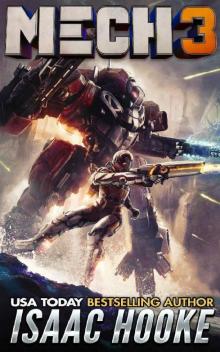 Mech 3
Mech 3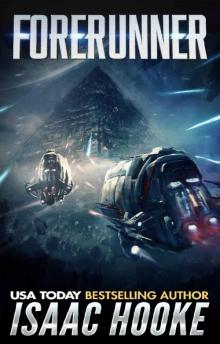 Forerunner
Forerunner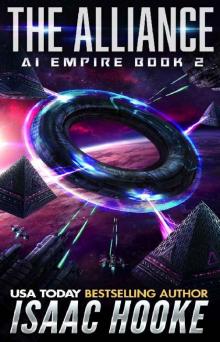 The Alliance (AI Empire Book 2)
The Alliance (AI Empire Book 2)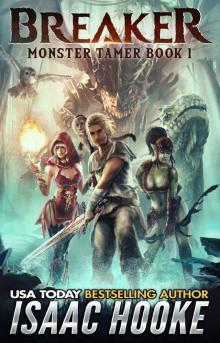 Breaker (Monster Tamer Book 1)
Breaker (Monster Tamer Book 1)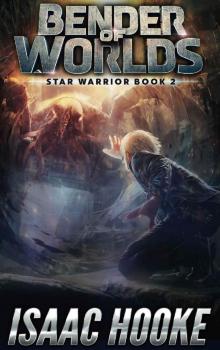 Bender of Worlds
Bender of Worlds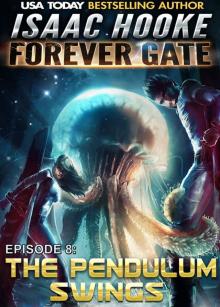 The Pendulum Swings (The Forever Gate Book 8)
The Pendulum Swings (The Forever Gate Book 8)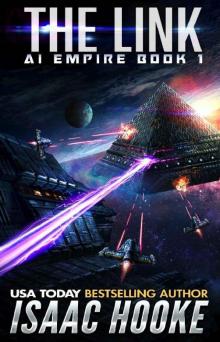 The Link
The Link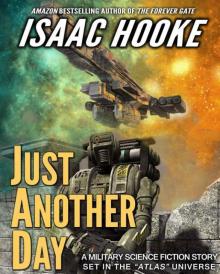 Just Another Day
Just Another Day Star Warrior
Star Warrior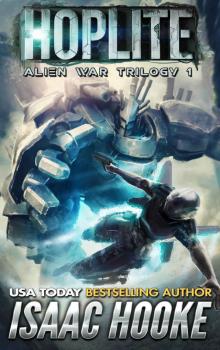 Alien War Trilogy 1: Hoplite
Alien War Trilogy 1: Hoplite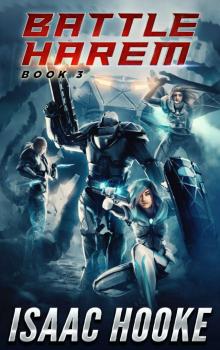 Battle Harem 3
Battle Harem 3 The Ethan Galaal Series: Books 1 - 3
The Ethan Galaal Series: Books 1 - 3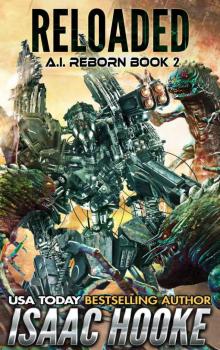 Reloaded
Reloaded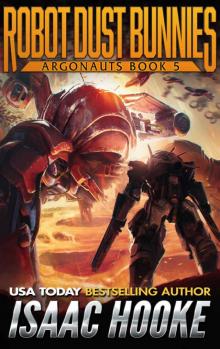 Robot Dust Bunnies (Argonauts Book 5)
Robot Dust Bunnies (Argonauts Book 5) Battle Harem
Battle Harem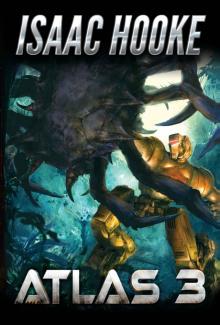 ATLAS 3 (ATLAS Series Book 3)
ATLAS 3 (ATLAS Series Book 3)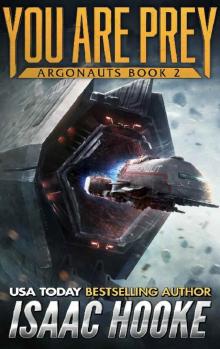 Argonauts 2: You Are Prey
Argonauts 2: You Are Prey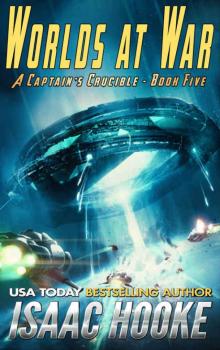 Worlds at War (A Captain's Crucible Book 5)
Worlds at War (A Captain's Crucible Book 5)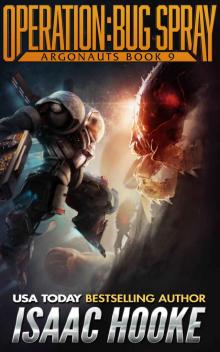 Operation: Bug Spray (Argonauts Book 9)
Operation: Bug Spray (Argonauts Book 9)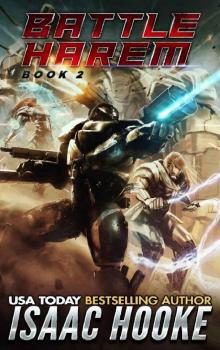 Battle Harem 2
Battle Harem 2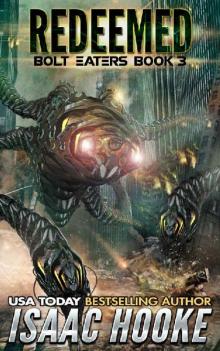 Redeemed (Bolt Eaters Trilogy Book 3)
Redeemed (Bolt Eaters Trilogy Book 3)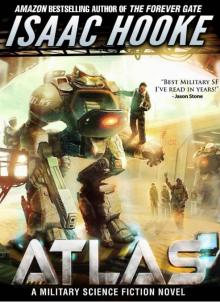 Atlas
Atlas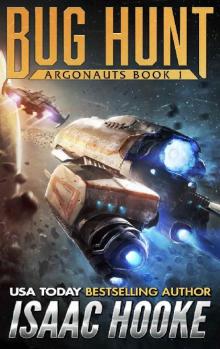 Argonauts 1: Bug Hunt
Argonauts 1: Bug Hunt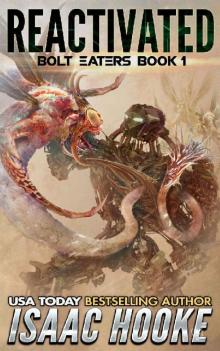 Reactivated (Bolt Eaters Trilogy Book 1)
Reactivated (Bolt Eaters Trilogy Book 1)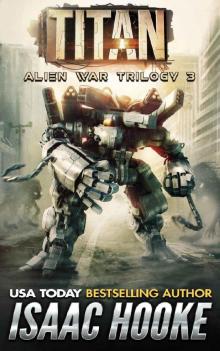 Alien War Trilogy 3: Titan
Alien War Trilogy 3: Titan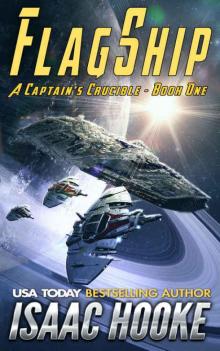 Flagship (A Captain's Crucible #1)
Flagship (A Captain's Crucible #1)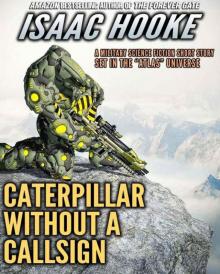 Caterpillar Without A Callsign
Caterpillar Without A Callsign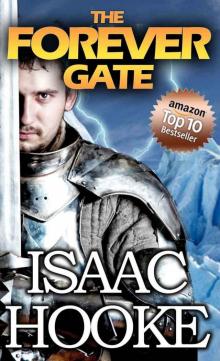 The Forever Gate
The Forever Gate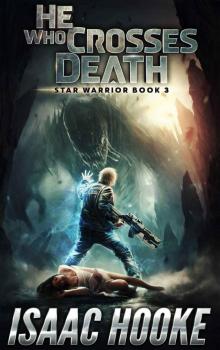 He Who Crosses Death (Star Warrior Quadrilogy Book 3)
He Who Crosses Death (Star Warrior Quadrilogy Book 3)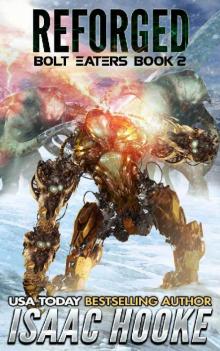 Reforged (Bolt Eaters Trilogy Book 2)
Reforged (Bolt Eaters Trilogy Book 2)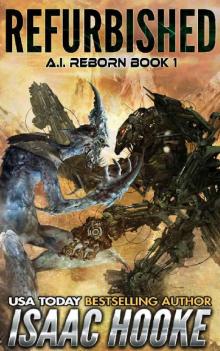 Refurbished
Refurbished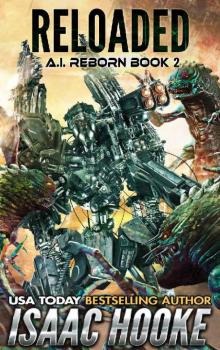 Reloaded (AI Reborn Trilogy Book 2)
Reloaded (AI Reborn Trilogy Book 2)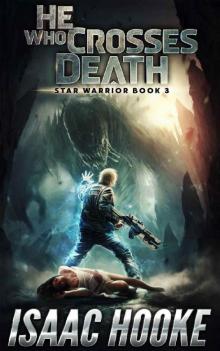 He Who Crosses Death
He Who Crosses Death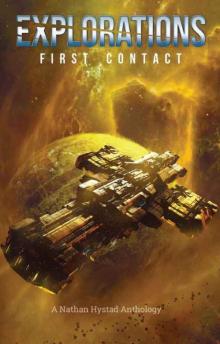 Explorations: First Contact
Explorations: First Contact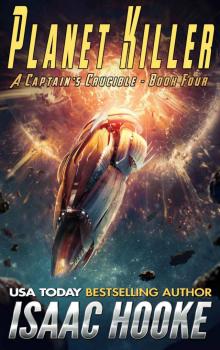 Planet Killer (A Captain's Crucible Book 4)
Planet Killer (A Captain's Crucible Book 4)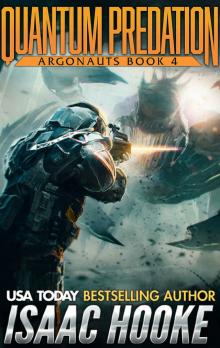 Quantum Predation (Argonauts Book 4)
Quantum Predation (Argonauts Book 4) Clandestine-IsaacHooke-FreeFollowup
Clandestine-IsaacHooke-FreeFollowup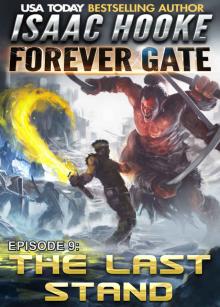 The Last Stand (The Forever Gate Book 9)
The Last Stand (The Forever Gate Book 9)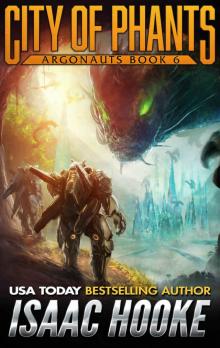 City of Phants (Argonauts Book 6)
City of Phants (Argonauts Book 6)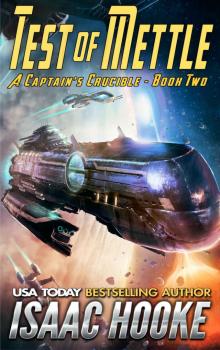 Test of Mettle (A Captain's Crucible Book 2)
Test of Mettle (A Captain's Crucible Book 2)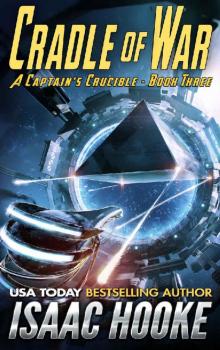 Cradle of War (A Captain's Crucible Book 3)
Cradle of War (A Captain's Crucible Book 3)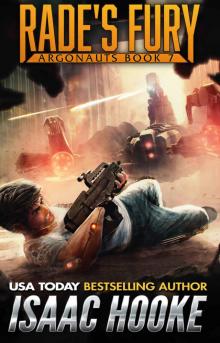 Rade's Fury (Argonauts Book 7)
Rade's Fury (Argonauts Book 7)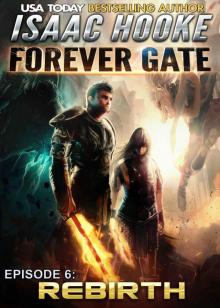 Rebirth (The Forever Gate Book 6)
Rebirth (The Forever Gate Book 6)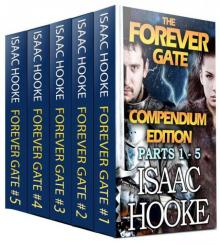 The Forever Gate Compendium Edition
The Forever Gate Compendium Edition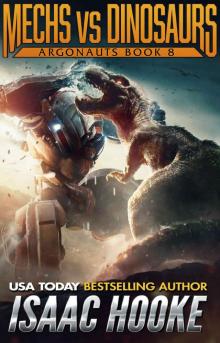 Mechs vs. Dinosaurs (Argonauts Book 8)
Mechs vs. Dinosaurs (Argonauts Book 8)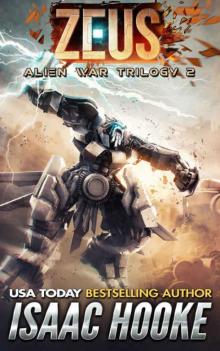 Alien War Trilogy 2: Zeus
Alien War Trilogy 2: Zeus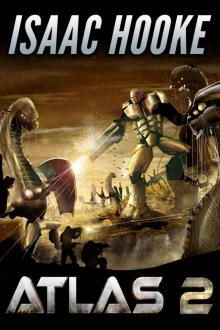 ATLAS 2 (ATLAS Series Book 2)
ATLAS 2 (ATLAS Series Book 2)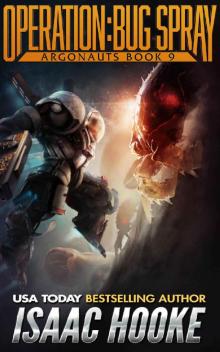 Operation_Bug Spray
Operation_Bug Spray